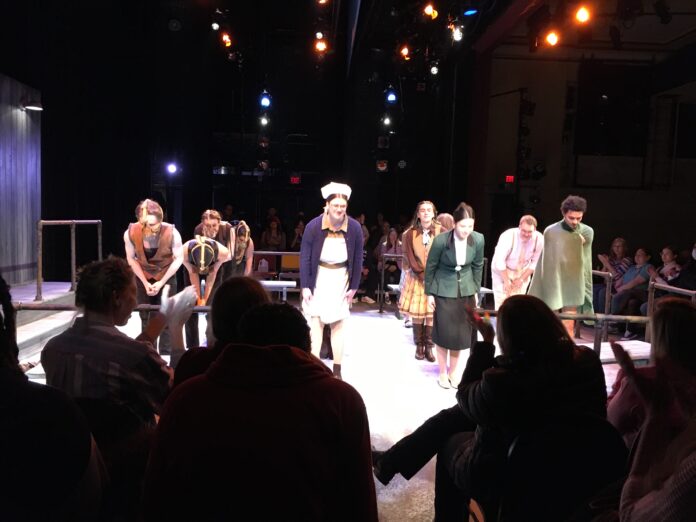On Thursday, Feb. 16, in the Tohill Theater connected to Bunce Hall, the College of Performing Arts’ Department of Theater and Dance celebrated their opening night of “Equus.” The play, written by Peter Schaffer, centers around the inner turmoil of a child psychologist upon beginning the treatment of a 17-year-old boy who had blinded six horses.
The character of Martin Dysart, the psychiatrist at the center of the play, was played by junior theater major Alec Lacher. Alan Strang’s character, the young man who used a hoof pick to blind horses in the stable he worked at in the middle of the night, was played by sophomore theater major Dawn McCall.
Gian Gabriel Robles attended the production.
“It’s a very creative play. I very much enjoyed seeing how a relationship between a psychiatrist and a more disturbed patient, how it starts to affect the psychiatrist… good to see the psychiatrist as a person as well,” Robles said.
Set design was minimal — consisting of four benches, some metal fencing and a large sliding stable door.
Unlike most performances held in Tohill Theater, all of the seating was up close and personal, with three sections of chairs directly on the stage with the performers.
The production was directed by Dane Eissler, a Rowan alumnus currently working as the artistic producer for EgoPo Classic Theater in Philadelphia. Eissler described the play as a “bucket list” production for him.
The play was written by Schaffer in 1973, which Eissler highlights in the program’s director’s note as being a time of particular unease for queer communities in the United Kingdom, Schaffer’s native country.
“We focused on the queer elements of the story and how it’s a Greek tragedy scale of this psychiatrist’s descent into finding an obsession over his patient, this kid who stabbed these horses’ eyes out, but realizing these kind of queer undertones to this kid, seeing it in himself and kind of like [thinking], ‘maybe through helping this kid I can help me,’” Eissler said.
Eissler also highlighted how the UK’s decriminalization of homosexuality six years prior to the writing of the play in 1967 had led to a 300% increase in the arrests of queer people throughout the country on charges of “public indecency.”
“The whole background of when this play was written, the author was gay… it was a really terrible time to be gay specifically in the UK, but you know, kind of everywhere. And so that kind of paranoia and desperate salvation seeking is something that we’re really emphasizing in this production,” Eisser said.
The play also dealt heavily with themes of worship, religion and faith, with frequent conversations between characters on the topics. The character of Alan Strang worshiped horses as gods, viewing the stable as a temple.
Irianis Estevez also attended the production.
“I just like how all the characters played a specific role in the play. With [Alan’s] mother being so religious and his father being an atheist, it seems like he’s been raised in a house with a lot of controversy about religion,” Estevez said.
While the run of “Equus” is over, the Department of Theater and Dance will be presenting the musical “Head Over Heels” and a choreography showcase in April. The department can also be followed on Instagram @rowantheatredance and on Facebook at Rowan University Department of Theatre & Dance.
For questions/comments about this story email the.whit.arts@gmail.com or tweet @TheWhitOnline.






